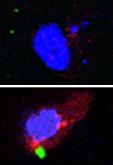
Credit: Andrew Bowie and Michael Carty, Trinity College Dublin
Scientists from Trinity College Dublin have discovered a potential new target for regulating inflammation, which drives a range of diseases including diabetes, cancer and Alzheimer’s. The potential target is an ancient immune protein – SARM – that has been conserved throughout evolution and thus is very similar in humans, other mammals, flies and worms.
The scientists, from Trinity’s School of Biochemistry and Immunology based at the Trinity Biomedical Sciences Institute (TBSI), discovered a previously unknown but important role that SARM plays in the immune response. Their work has been published today in the prestigious journal Immunity.
The innate immune system and SARM
The innate immune system is activated as a protective mechanism in response to cells sensing the presence of strangers such as bacteria and viruses, or of dangers such as tissue injury. This innate immune activation leads to inflammation. However, excessive and/or inappropriate inflammation is implicated in a range of debilitating diseases and so controlling inflammation presents a major problem that scientists are trying to solve.
Specifically, it is inflammasomes – tiny molecular machines – that assemble inside immune cells after sensing infection or injury and initiate the inflammatory response. When assembled, inflammasomes trigger 1) the release of an inflammatory mediator (interleukin-1, or IL-1) and 2) instigate an inflammatory form of cell death (pyroptosis).
Both of these actions can drive inflammation, but what controls the amount of IL-1 produced and the extent of pyroptosis that occurs during inflammation was previously unknown. It turns out that SARM is a key inflammasome regulator.
In their study, the scientists showed that the more SARM that cells contain, the less IL-1 they produce, because SARM interferes with inflammasome assembly. Conversely, more SARM leads to more cell death since SARM causes significant damage to mitochondria, the energy producers of the cell.
The work, which was funded by Science Foundation Ireland, was conducted by scientists in Professor Andrew Bowie’s research group, in particular co-first authors Dr Michael Carty and Dr Jay Kearney. Other TBSI scientists involved include Professors Ed Lavelle and Padraic Fallon.
Dr Michael Carty, lead author of the study, said: ”We’ve been working to try to unlock the secrets of what this ancient protein does for some time, and it was a surprise to find that it could be a key regulator of the inflammasome, which may implicate SARM in inflammatory diseases.”
Professor of Innate Immunology at Trinity, Andrew Bowie, added: “Scientists already knew that SARM drives cell death in the brain, and as a result it is being investigated as a therapeutic target for neurodegeneration and related diseases, but here we found that it is also a key immune regulator in peripheral immune cells. This discovery gives us hope that if we can successfully target SARM we may be able to regulate inflammation, which would provide a new option for treating a plethora of diseases.”
###
Media Contact
Thomas Deane
[email protected]
Related Journal Article
http://dx.




